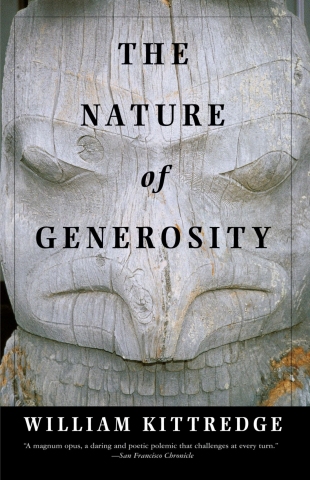"The Cockerall Butterfly Center was closer to the bone. Who could dream this up? Maybe someone feeling deprived, tired of closing their eyes. Two thousand quasi-free butterflies, fifty to sixty widely different varieties, were fluttering away their lives within the expansive confines of a cone-shaped three-story glass tower. We walked beside waterfalls in a flowering multitiered jungle, and the butterflies sometimes were attracted to bright colors; they rode on Annick's loose silvery hair like fluttering decorations, and contributed, as unrestrained creatures will, to restoring our shot nerves. Maybe that's civilization's main reason for contact with other forms of life these days; we like to have them around because their presence reminds us of rhythms that might keep us sane. We go to petting zoos in order to touch and witness emergence and interconnection and rebirth; we plug into situations where we can practice dancing the big dance, the old contact sport, with animals. The creatures, alone with us amid infinities, are our only companions. As we watch, life forms are disappearing. It's like watching our invulnerabilities vanish. Of all our myriad duties, preservation has to be central.
"Late that afternoon in Houston, we walked across great lawns to contemplate another actuality, the ensemble of murals Mark Rothko created for the eight–sided de Menil chapel, fields of radiant darkness, from which there came no message but whatever each viewer called up. For me, it was the demands of acceptance. On that bright afternoon, I thought of Glenn Gould in the studio he built in the backlands of Canada, humming along to immaculate Bach and then, in between times, on the telephone to faraway friends; and then of the aged stranger Piet Mondrian, poor and exiled in New York during World War II, surely dying, but out wandering Times Square at night, infatuated with the neon and skyscrapers and with Meade Lux Lewis and Teddy Wilson and Dizzy Gillespie and Charlie Parker, with Fred Astaire and Ginger Rogers — Mondrian, an old man jitterbugging at parties.
"In 1968, the year before he died, he came forward with his final masterpiece, the multirhythmic Broadway Boogie Woogie in red and blue and vivid yellow, which I can only think of as sprung from the a soul at the end of things. Facing death, we can feel about to be cut out and excluded from the feast of being, and angrily eager to defeat loss in an effort to heal ourselves, or else we can enjoy having been included, suffering the fate of being part of everything.
"Mark Rothko and Glenn Gould and Piet Mondrian gave their work as a gift. Harmony and dancing are a form of prayer. There's nothing to do but make peace with the rising flames while the house is burning, a try at joyousness, like Mondrian at some party in New York or Glenn Gould up north, humming and dialing.
"In 'Song of Myself,' Whitman says of animals, 'Not one is respectable or unhappy over the whole earth.' Should we envy them and want to be like them? Probably not. Our species cannot comfortably live without intelligently defined purposes. But which?
"The garden we are creating of the world can be denuded and perilous, a location where the poor and disenfranchised scrap in the night, and where the privileged dither in their selfish waltz toward death. Or it can be plentiful and democratic, a peaceful stage where citizens enact a drama centered on serving what we have and one another. The agenda I propose is simple enough. We must relearn the arts of generosity. We cannot, in any long run, survive by bucking against natural forces, and it is our moral duty to defend all life.
"It's time to give something back to the systems of order that have supported us: care and tenderness. As we work on behalf of one another and the world, we begin to experience the solace of reinhabiting our emotional skins. Generosity is the endless project."
